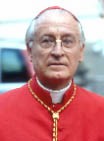Cardinal Ricardo María Carles Gordó, Archbishop emeritus of Barcelona (Spain), was born in Valencia, Spain on 24 September 1926. He was educated at the Teresian school in Valencia and went on to complete his secondary education with the Jesuit Fathers at St Joseph's College in the same city.
After a period of discernment - during which he found the guidance of a diocesan priest and a very wise and holy monk most useful - despite feeling deeply attracted to scientific studies, especially chemistry - he decided to devote his life to the commitment of full consecration to God. He entered the Major Seminary of the Archdiocese of Valencia where he embarked upon ecclesiastical studies. During those years he was a pupil at the 'Corpus Christi' College (also called of the Patriarch) of Valencia.
He was ordained priest in the same city on 29 June 1951. He subsequently obtained a degree in canon law at the Pontifical University of Salamanca (1953).
In his native Diocese he carried out various parish tasks including that of parish priest and archpriest of Ternes di Valldigna (1953) and rector of the parish of San Fernando in the city of Valencia (1967). He devoted himself particularly to the pastoral care of youth and was councillor of the JOC, an apostolate for young labourers.He was subsequently appointed rector of the boarding-school for deacons, episcopal delegate for the clergy and diocesan councillor for the family apostolate.
On 6 June 1969 he was nominated Bishop of Tortosa and on 3 August he was ordained.
His conciliar attitude led him to reinforce institutions for the communion and participation of priests and lay people in the apostolate. He convoked and promoted a diocesan Synod, widely attended by lay people from all the parishes of Tortosa. Several Synodal constitutions were the result of this Synod and identified diocesan pastoral options which were clearly evangelizing and missionary.
He has been a member of various episcopal commissions, president of the sub-commission for the family and president of the commission for seminaries and universities.
On 23 March 1990, the Holy Father named him Archbishop of Barcelona and on 27 May that same year he took possession of the Archdiocese. During his episcopate in Barcelona, his conciliar spirit led him to establish presbyterial and pastoral diocesan councils.
His Guidelines for diocesan pastoral care materialized in the Pastoral Plan: 'Identity, Communion, Evangelization' addressed to five categories: non-practising believers, non-believers, youth, the marginalized, immigrants and families. His ministry at the head of the Archdiocese aimed to raise the standard of spirituality - in particular he created the Barcelona Institute for Spiritual Theology which has already been functioning for four years - and to promote the pastoral care of the marginalized by means of social action in the neediest areas of the great city of Barcelona and its industrial suburbs. The problems that most concern Archbishop Carles Gordó are the diocesan seminary and priestly vocations. He has reorganized the vast Archdiocese, into four episcopal zones entrusted to five auxiliary Bishops who were appointed after his arrival in the Archdiocese of Barcelona. Together with the other Catalan Dioceses - suffragans of the Archdiocese of Tarragona - and through a special concession granted by the Holy Father, the Archdiocese of Barcelona is also taking part in the Provincial Council of Tarragona, prepared for by a detailed reflection in all the parishes and pastoral groups and whose sessions will take place during the 1995.
One of the topics which most interests the Archbishop of Barcelona is the relationship between faith and culture. He is the author of a book entitled precisely Fe y Cultura, which is a collection of conferences and studies on this theme and the weekly pastoral letters which he started to produce while he was still Bishop of Tortosa. On the occasion of the 25th anniversary of his episcopal ordination, he has published the work Cartas desde la vida misma, which gathers his weekly writings on current topics, published in various journals and broadcast on the radio. Indeed, Archbishop Carles Gordó attaches great importance to the presence of the Christian message in the modern media.
Archbishop emeritus of Barcelona, 15 June 2004.
He participated in the conclave of April 2005, which elected Pope Benedict XVI.
Created and proclaimed Cardinal by St. John Paul II in the Consistory of 26 November 1994, of the Title of S. Maria Consolatrice al Tiburtino (St. Mary of Consolation in Tiburtino).
Cardinal Ricardo María Carles Gordó died on 17 December 2013.

